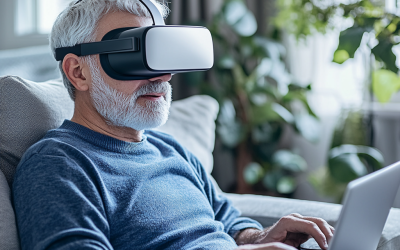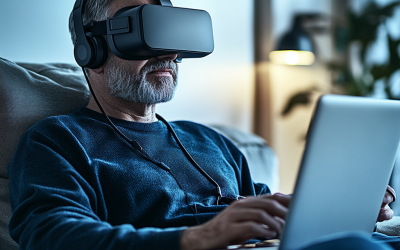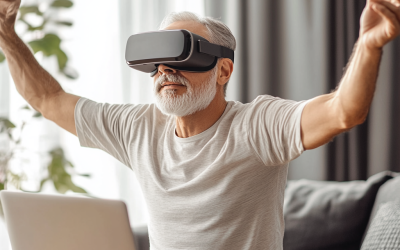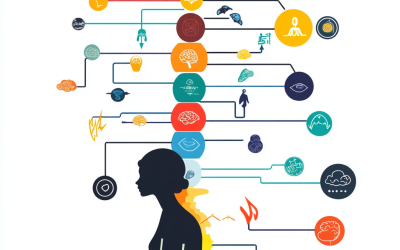Latest Blog Articles
How Biofeedback Therapy Can Improve Sleep and Reduce Insomnia
Sleep is a complex physiological process regulated by the brain and autonomic nervous system. Insomnia can result from stress, anxiety, poor sleep habits, or imbalances in the nervous system. Common sleep-related issues include: Difficulty falling asleep (sleep onset...
Biofeedback Therapy Goes High-Tech: How AI is Revolutionizing Mind-Body Healing
Introduction Biofeedback therapy has long been a cornerstone of mind-body healing, helping individuals regulate their physiological responses to stress, pain, and mental health conditions. However, the field is now undergoing a technological revolution, with...
Heart Rate Variability (HRV) Biofeedback: The Key to a Healthier Heart
Introduction Heart health is a critical component of overall well-being, yet cardiovascular diseases remain the leading cause of death worldwide. While diet, exercise, and medication play essential roles in heart health, emerging research suggests that Heart Rate...
The Science Behind Biofeedback: Can You Really Control Your Body’s Reactions?
Introduction Imagine being able to control your heart rate, muscle tension, and stress levels without medication—just by training your brain and body to work in harmony. This is the promise of biofeedback therapy, a revolutionary approach that enables individuals to...
Can Biofeedback Therapy Help with Anxiety and PTSD?
Introduction Biofeedback therapy has emerged as a significant modality in pain management, offering individuals the tools to gain voluntary control over physiological processes typically considered involuntary. By monitoring real-time data on muscle tension, heart...
Biofeedback Therapy for Effective Pain Management: Insights and Practices
Introduction Biofeedback therapy has emerged as a significant modality in pain management, offering individuals the tools to gain voluntary control over physiological processes typically considered involuntary. By monitoring real-time data on muscle tension, heart...
Revolutionizing Pain Management: The Role of VR Therapy in Modern Rehabilitation
Introduction Chronic pain affects millions worldwide, leading to diminished quality of life and substantial healthcare costs. Traditional pain management strategies often rely on pharmacological interventions, which can have limited efficacy and potential side...
Advancements in Virtual Reality Therapy: Enhancing Pain Perception and Rehabilitation Outcomes
Introduction Chronic pain and the need for effective rehabilitation strategies present significant challenges in healthcare. Traditional methods often involve pharmacological interventions, which may lead to side effects and dependency. In recent years, Virtual...
Cognitive Behavioral Therapy for Chronic Pain: Rewiring the Brain for Relief
Introduction Cognitive Behavioral Therapy (CBT) has emerged as a powerful, evidence-based approach for managing chronic pain. By altering maladaptive thought patterns, CBT helps individuals reframe their experience of pain, leading to significant reductions in pain...
The Evolution of Cognitive Behavioral Therapy (CBT) into a Leading Pain Management Therapy
Introduction Cognitive Behavioral Therapy (CBT) has long been recognized as an effective treatment for mental health disorders such as anxiety and depression. However, in recent decades, CBT has evolved into a powerful tool for managing chronic pain. By addressing the...
Harnessing Virtual Reality Therapy for Pain Management and Rehabilitation: Insights from Clinical Studies
Introduction Chronic pain and the need for effective rehabilitation strategies present significant challenges in healthcare. Traditional methods often involve pharmacological interventions, which may lead to side effects and dependency. In recent years, Virtual...
Leveraging Virtual Reality Therapy to Alleviate Depression and Anxiety: An In-Depth Exploration
Introduction Depression and anxiety are pervasive mental health disorders affecting millions globally, leading to significant personal distress and societal burden. Traditional therapeutic approaches, while effective for many, often face challenges such as...
Exploring Virtual Reality Therapy: Innovative Approaches to Pain Relief and Rehabilitation
Introduction VR therapy leverages immersive technology to create interactive virtual environments that engage multiple senses. This multisensory engagement can modulate pain perception through several mechanisms: Distraction: Engaging in immersive VR experiences...
The Evolution of Cognitive Behavioral Therapy (CBT) into a Leading Pain Management Therapy
Introduction Cognitive Behavioral Therapy (CBT) has long been recognized as an effective treatment for mental health disorders such as anxiety and depression. However, in recent decades, CBT has evolved into a powerful tool for managing chronic pain. By addressing the...
Cognitive Behavioral Therapy for Chronic Pain Management: A Science-Backed Approach to Lasting Relief
Introduction Chronic pain affects millions of people worldwide, significantly diminishing their quality of life. While medication and physical therapy offer some relief, Cognitive Behavioral Therapy (CBT) has emerged as a powerful, evidence-based solution for managing...
Implementing Cognitive Behavioral Therapy for Chronic Pain Management: Insights from neuroTree’s neuroVive Program
Chronic pain, affecting millions worldwide, often persists beyond the typical healing period, significantly impairing quality of life. Traditional medical treatments may fall short, necessitating integrative approaches like Cognitive Behavioral Therapy (CBT)....
Cognitive Behavioral Therapy for Chronic Pain: A Proven Approach to Pain Relief and Resilience
Introduction Cognitive Behavioral Therapy (CBT) has emerged as a cornerstone in the psychological management of chronic pain. This structured, time-limited psychotherapy focuses on identifying and modifying negative thought patterns and behaviors that exacerbate pain...
Interdisciplinary Columnists

Satinder Grewal, MD
Medical Director

Jennifer Kljajic, LCSW
Clinical Director

Yuki J. M. Acs, Psy.D
Clinical Psychologist

Mark Bernardi, MD
Emergency Medicine
Locations
California
Headquarters: 400 Corporate Pointe Suite 300,
Culver City, CA 90230
Pasadena Clinic: 380 South Lake Avenue Suite 101b, Pasadena, CA 91101 (By Appointment Only)
Mailing: 530 South Lake Avenue #149,
Pasadena, CA 91101
Arizona
Clinic: 455 N Mesa Dr Suite 8W-105
Mesa, AZ 85201
Support
California
Los Angeles: (310) 322-2361
Arizona
Mesa: (480) 360-3656
About neuroTree™
We are a California- and Arizona-based organization dedicated to building a premier network of licensed clinicians specializing in mental health, neurodiverse conditions, and chronic pain management. Offering the majority of our services via telehealth, with in-person care also available, we empower individuals to overcome barriers to well-being through expertise in health risk mitigation, mental health support, pain management, nutritional psychiatry, tailored vitamin infusion therapies (IV/IM), and medication management. With over 35 years of collective experience, our team has treated severe mental illness, trauma, psychosis, and a wide range of complex pain conditions, including Temporomandibular Disorders (TMD), arthritis, joint pain, back and neck pain, cancer-related pain, migraines, testicular pain (orchialgia), scar tissue pain, fibromyalgia, and neurogenic pain.
Insurances We Cover




Expert Pain Psychologists.
Professional Care.
Schedule your appointment today to connect with a top-tier licensed clinician and take the first step toward lasting relief from chronic pain and trauma. If your insurance doesn’t cover our services, we offer flexible private pay options and financing through CareCredit to ensure you receive the care you need without financial barriers.

Offering cutting-edge Virtual Reality Pain Therapy guided by expert clinicians specializing in biofeedback, chronic pain management, and neurology. Our innovative approach leverages immersive technology to enhance pain relief, improve coping strategies, and promote long-term well-being.
Submit your referral or self-referral.
If you qualify, one of our representatives will connect with you within 12-48 hrs.
Why Choose Us
Accessible With Tech-Enabled Care
We use the latest web technologies with user-friendly modalities to connect with our providers.
Short Wait Times
Our team works fast to connect you with one of our quality expert clinicians.
Over 35 Years Experience
Our expert clinicians have decades worth of experience treating and supporting the management of nutritional health, mental health, and chronic pain challenges.
Frequently Asked Questions
NeuroTree Treatment Program
All questions and answers below reflect the most common inquiries we receive. Please take a minute to review before chatting with our agent that way you can get your question answered immediately.
Do you accept walk-in's?
No, we are by appointment only.
Is There a cost for me?
If you are a Medicare Part B beneficiary, the Clinical services are cost-free excluding Interventional Therapy services.
How long do I have to commit myself to treatment?
It all depends on your psychological evaluation. In some cases, individuals commit to an 8-week program, others are ongoing and find our treatment providers to be a consistent source of stability and major support in managing and reducing chronic pain and/or trauma experiences.
Where do I meet the clinician?
Most of our providers are accessed through telehealth video conferencing platforms by phone and computers. Depending on your geographical location, you are able to meet in-person.
What forms do I need to fill out in order to access treatment?
There are three main forms we require you to fill out in order to schedule you in to see our provider. The first is our universal intake form. The second is an outpatient contract form. The third is an authorization form you provide to your primary doctor to sign off on to access free treatment.
How do you store my public health Information in your system?
We use HIPAA-compliant servers and our very own electronic health records system (EHR) to store non-public data and encrypt all throughout communications, booking of appointments, and notes to ensure your PHI has maximum protection. Upon request, we delete all records and automatically discard non-active clients every three years.
Book an Appointment Today!
Click the button below to book an appointment and begin taking control and reducing your chronic pain and/or trauma experiences.
Contact us
Call Us
CA: (310) 322-2361
AZ: (480) 360-3656
Email Us
Our Locations
400 Corporate Pointe Suite 300 Culver City, CA 90230
455 N Mesa Dr Suite 8W-105, Mesa, AZ, 85201
380 South Lake Avenue Suite 101b, Pasadena, CA 91101
2537 St Andrews Dr, Glendale, CA 91206
Get in touch
Servicing
California Department of Developmental Services (CDDS)
CDDS Street Address
1600 9th Street
Sacramento, CA 95814
CDDS Mailing Address
P. O. Box 944202
Sacramento, California 94244-2020
CDDS General Information
For general inquiries,
call (916) 654-1690 or TTY: 711


















